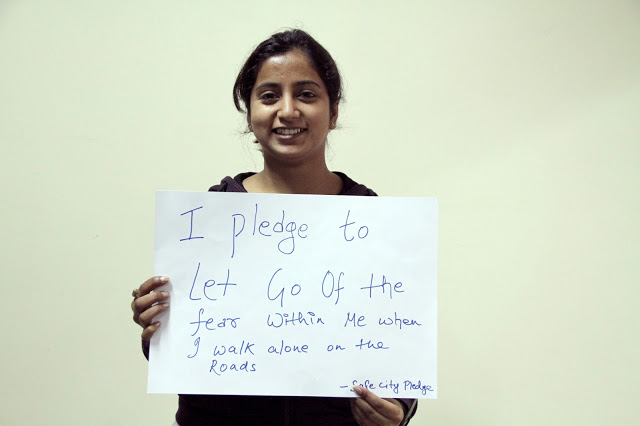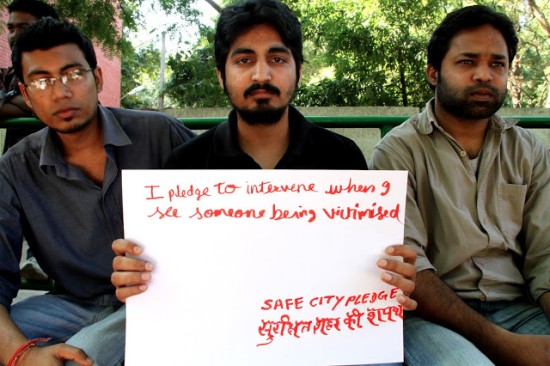A Twitter campaign has Indians flooding social media with personal promises to combat sexual harassment and sexism.
On the heels of the brutal gang rape of a young woman in a moving bus in Delhi, volunteer-led community art project Blank Noise invited users during a 24-hour tweetathon on 19 January, 2013 to publish a pledge committing to new ideas that make cities safer spaces for women.
The #SafeCityPledge campaign was one of the top trending topics in India on that day, and the tweets, some featuring photos of users holding placards with their pledge, have poured in ever since.
“I pledge to stand up for my rights, however intimidating the circumstances,” a placard held by a woman in Calcutta reads.
“I pledge to behave like a man and stop behaving like a beast,” another reads, this time held by a man surrounded by his male friends.
P Bharat in Shakhti, a women's rights blog, compiled and summarized some of the ideas and pledges shared, which attacked the culture of patriarchy and the tendency to blame the victim, among other things:
* “I pledge to not be a mute bystander. To intervene. To change the scene.”
* “Staring is not acceptable. Smile and look away. Make others comfortable please.”
* “I will support my friends whenever they feel persecuted by men, I will not let men intimidate women anywhere i am”
* “never vote for parties that have rapists in their midst & justify them.”
* “I pledge to stop making sexist jokes and open conversations about equality of genders at home.”
Sexual violence against women and girls in India has been under intense scrutiny since the December 2012 gang rape, after which the victim died of her injuries, and similar incidents this year. Faced with public outcry, the government passed a new bill containing harsher punishments, including the death penalty, for rapists.
Fueled by the rash of high-profile incidents, the movement against sexual harassment and sexism has gained steam online and offline. Another initiative called Safecity tracks street harassment in India using crowdsourced reports. The reports illustrate that street harassment of women is still a burning problem in India.
There have also been a number of street protests and rallies featuring pledges for a safe city for women in Goa, Bangalore, Delhi, Pune, and Kolkata organized using social media.
Anu Elizabeth Roche, a volunteer for the non-profit Akanksha Foundation, which works with underprivileged children, wrote on Facebook about one such demonstration in Mumbai:
A number of men and women – young and old – came with their own placards and slogans pledging to promote heightened action against sexual harassment, sexist attitudes and generally spoke for reclaiming their spaces in public spheres especially.
And #SafeCityPledge recently held a workshop at Cambridge School Delhi, with 600 students between 14-17 years participating.
Blogger Sahar Zainab recalls her personal experience reading the #SafeCityPledge tweets with a mixture of hope and hard realism:
I especially love the picture of the woman from Lucknow, dupatta wound tightly around her head, pledging ‘humein baahar aane jaane par kisi ki rokk-tokk manzur nahi’ (we will not accept anyone else's control on our coming and going outside)!
But truth is that there remains a (humongous) faction of women, young girls, and even younger girls in villages, in small towns, in bigger towns, and in even bigger cities, who have yet to muster up such courage.
Check out the #SafeCityPledge campaign on their blog, Twitter, and Facebook.









1 comment